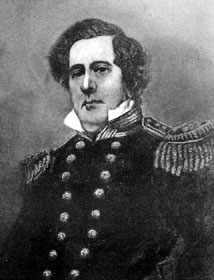| Matthew Perry  AKA Matthew Calbraith Perry AKA Matthew Calbraith Perry
Born: 10-Apr-1794
Birthplace: South Kingston, RI
Died: 4-Mar-1858
Location of death: New York City
Cause of death: unspecified
Remains: Buried, Island Cemetery, Newport, RI
Gender: Male
Race or Ethnicity: White
Sexual orientation: Straight
Occupation: Military Nationality: United States
Executive summary: Opened Japan to the west Military service: US Navy (1809-58) American naval officer, was born in South Kingston, Rhode Island, on the 10th of April 1794. He became a midshipman in 1809, and served successively in the schooner "Revenge" (then commanded by his brother, Oliver Hazard Perry) and the frigate "President." In 1813 he became a lieutenant, and during the War of 1812 served in the frigate "United States" (which, when abandoned by Perry, was blockaded in the harbor of New London, Connecticut), the "President" and the "Chippewa." Soon after the war Perry was assigned to the Brooklyn navy yard, where he served until 1819. He became a commander in 1826, and during 1826-1830 was in the recruiting service at Boston, where he took a leading part in organizing the first naval apprentice system of the United States Navy. He was promoted in 1837 to the rank of captain (then the highest actual rank in the United States Navy), and in 1838-1840 commanded the "Fulton II", the first American steam war vessel. He also planned the "Missouri" and the "Mississippi", the first steam frigates of the United States Navy, and was in command of the Brooklyn navy yard from June 1841 until March 1843, when he assumed command of a squadron sent to the African coast by the United States, under the Webster-Ashburton treaty, to aid in suppressing the slave trade. This command of a squadron entitled him to the honorary rank of commodore. On the 23rd of October 1846, during the Mexican War, Perry, in command of the steam vessels "Vixen" and "McLane", and four schooners, attacked and captured Frontera, at the mouth of the Tabasco river, then pushed on up the river and (on the 24th) captured the town of Tabasco, thereby cutting off Mexico from Yucatan. He relieved Commodore David Conner at Vera Cruz on the 21st of March 1847, and after a two days' bombardment by a battery landed from the ships the city wall was breached sufficiently to admit the entrance of troops.
Commodore Perry's distinctive achievement, however, was his negotiation in 1854 of the treaty between the United States and Japan, which opened Japan to the influences of western civilization. Perry sailed from Norfolk, Virginia, on the 24th of November 1852, in the "Mississippi." He reached Hong Kong on the 7th of April and on the 8th of July dropped anchor off the city of Uraga, on the western shore of Tokyo Bay with the "Susquehanna", his flagship, the "Mississippi", and the sloops-of-war "Saratoga" and "Plymouth." On the 14th of July, accompanied by his officers and escorted by a body of armed marines and sailors (in all about 300 men), he went ashore and presented to commissioners especially appointed by the shogun to receive them, President Millard Fillmore's letters to the emperor, and his own credentials. A few days later the American fleet sailed for Hong Kong with the understanding that Perry would return in the following spring to receive the emperor's reply. On the 11th of February, accordingly, he reappeared in Tokyo Bay with his fleet -- this time composed of the "Susquehanna", "Powhatan" and "Mississippi", and the sailing vessels "Vandalia", "Lexington" and "Southampton", and despite the protests of the Japanese selected an anchorage about 12 miles farther up the bay, nearly opposite the present site of Yokohama, and within about 10 miles of Edo (now Tokyo). Here, on the 31st of March 1854, was concluded the first treaty (ratified at Shimoda, on the 21st of February 1855, and proclaimed on the 22nd of June following) between the United States and Japan. The more important articles of this treaty provided that the port of Shimoda, in the principality of Izu, and the port of Hakodate, in the principality of Matsumai, were constituted as ports for the reception of American ships, where they could buy such supplies as they needed; that Japanese vessels should assist American vessels driven ashore on the coasts of Japan, and that the crews of such vessels should be properly cared for at one of the two treaty ports; that shipwrecked and other American citizens in Japan should be as free as in other countries, within certain prescribed limits; that ships of the United States should be permitted to trade at the two treaty ports under temporary regulations prescribed by the Japanese, that American ships should use only the ports named, except under stress of weather, and that privileges granted to other nations thereafter must also be extended to the United States. Commodore Perry died in New York City on the 4th of March 1858.
Father: Christopher Raymond Perry (b. 1761, d. 1818)
Brother: Oliver Hazard Perry (naval officer, b. 1785, d. 1819)
Requires Flash 7+ and Javascript.
Do you know something we don't?
Submit a correction or make a comment about this profile
Copyright ©2019 Soylent Communications
|